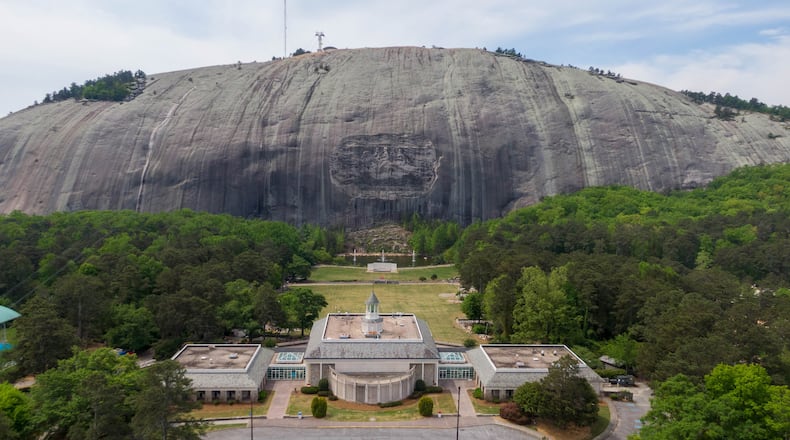Leaders at Stone Mountain Park have now issued a formal call for museum companies interested in creating a new exhibit to “tell the truth” about the history of the world’s largest Confederate monument.
But the timeline for such an exhibit’s creation is long — and plenty of questions and concerns remain.
After months of sustained pressure from local activists to make changes at the state-run park, the board of the Stone Mountain Memorial Association announced in April that it intended to create a new on-site museum exhibit. The exhibit, officials said, would seek to provide a more complete historical context for the park, its massive mountainside carving of Confederate leaders and other tributes to the Civil War South.
The mountain has no direct historical connection to the Civil War but was the birthplace of the second Ku Klux Klan. The carving of Jefferson Davis, Stonewall Jackson and Robert E. Lee was originally conceived during the Jim Crow era of the early 1900s but not finished until decades later, when historians say state leaders commissioned its completion as an expression of their displeasure with federally mandated desegregation.
Earlier this week, the memorial association issued a formal solicitation asking museum companies interested in creating such an exhibit to submit their proposals.
Memorial association CEO Bill Stephens said he had already heard from two or three major exhibit companies who were intrigued by the project, which he envisions as having “Smithsonian-like” quality.
“It’s important,” Stephens said, “and it’s going to be historic.”
The call for proposals asks interested companies to submit detailed conceptual plans for a 4,000-square-foot exhibit space on the second floor of Stone Mountain Park’s existing Memorial Hall building. It says that “current scholarship calls for a reexamination of the memorial’s history and the development of new interpretation,” but otherwise provides only a few specifics about that history.
Stephens said that wasn’t necessary.
“These companies know the issues very well, and they’re used to doing controversial projects and those of a historic nature,” Stephens said. “So we just think it’s understood that they would do their research on the history and present what they think is a true, accurate and factual telling of the story.”
An “open house” for potential bidders is scheduled for January, and proposals are not due until April 12, 2022. Development of the full exhibit plan would not be completed until early 2023, documents said.
Stephens attributed the lengthy timeline to the complexity of the undertaking.
A separate committee intended to help steer the exhibit’s content, meanwhile, still has not been assembled.
The committee, which Stephens and memorial association board chair Abraham Mosley have said will include community leaders and historians, was cleared to be created more than five months ago. While the memorial association board would maintain final approval, committee members would weigh in on suggestions and proposals from the company tasked with physically creating the exhibit.
Leaders originally predicted a relatively quick timeline for the committee’s selection process, but it has seemingly been harder than anticipated to attract potential committee members.
“A couple of historians that we talked with, to their credit, wanted to see some progress and actually know that it was going to be done,” Stephens said Wednesday. “By posting the [request for proposals] and by saying publicly that we’re actually doing this, that certainly helps in recruitment.”
Some activists, meanwhile, are skeptical about the entire process. They’re also more focused on advocating for other, quicker changes that could be made at the park.
Those include changing the names of streets that honor Confederate leaders and the name of the park’s Venable Lake. That body of water honors Samuel Venable, a Klansman whose family owned Stone Mountain and granted Confederate groups the original permission to create a carving on its northern face.
“None of these projects [like the museum exhibit] really do anything,” said Bona Allen, a leader of the Stone Mountain Action Coalition. “They’re not doing anything to remove names of KKK leaders from lakes.”
About the Author
Keep Reading
The Latest
Featured



